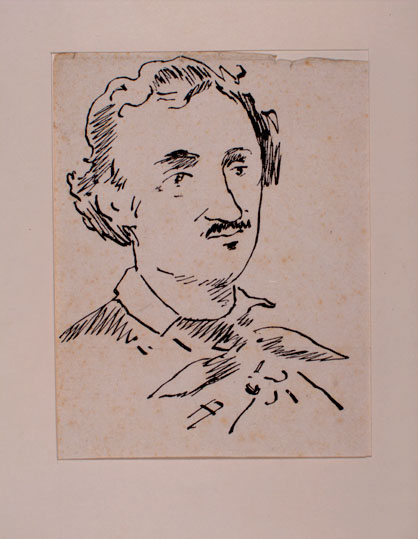Mournful and Never-ending Remembrance — Plus Bodysnatching?
Saturday, September 6, 2008
posted by Steve Tompkins
 Print This Post
Print This Post
The tug-of-war for the remains of a fallen champion is a motif as old as the Iliad, and in today’s New York Times Ian Urbina fills us in on just such a struggle for Edgar Allan Poe’s corpse and corpus:
…Last year Edward Pettit, a Poe scholar in Philadelphia, began arguing that Poe’s remains belong in Philadelphia. Poe wrote many of his most noteworthy works there and, according to Mr. Pettit, that city’s rampant crime and violence in the mid-19th century framed Poe’s sinister outlook and inspired his creation of the detective fiction genre.
“So, Philadelphians, let’s hop in our cars, drive down I-95 and appropriate a body from a certain Baltimore cemetery,” Mr. Pettit wrote in an article for the Philadelphia City Paper in October. “I’ll bring the shovel.”
So far, no one has taken up Mr. Pettit’s call for Philadelphia’s best grave robbers to bring home the city’s prodigal son before the bicentennial of Poe’s birth in January 2009. But the ghoulish argument between the cities over the body and legacy of the master of the macabre has continued in blogs and newspapers, and on Jan. 13 Mr. Pettit is to square off with an opponent from Baltimore to settle the matter in a debate at the Philadelphia Free Library.
“Philadelphia can keep its broken bell and its cheese steak, but Poe’s body isn’t going anywhere,” said Jeff Jerome, the curator of the Poe House in Baltimore and Mr. Pettit’s opponent in the debate.
“If they want a body, they can have John Wilkes Booth,” Mr. Jerome added, referring to Abraham Lincoln’s assassin, who is also buried in Baltimore.
In a nation where the next vice president could very well be a politician whose first instinct after taking office as mayor was to ban various books in her town’s library (Which might explain why she attended so many colleges in so few years: she kept being offended every time she ventured into the stacks of the successive institutions of learning), it’s reassuring to see cities fighting over a major writer. Urbina briefly considers the claims of not only Baltimore and Philadelphia but also Richmond and New York (The fact that Poe was actually born in Boston now seems as incongruous as Rusty Burke’s Brooklyn birth).
The article mentions that following Poe’s burial in 1849, his grave was first unmarked and then sans headstone for an untoward number of years. It occurs to me that some readers may not know the story of the first stone; here’s the Edgar Allan Poe Society of Baltimore:
Reports of Poe’s anonymous and unkempt grave began to circulate, first privately then in the newspapers. In 1860, Maria Clemm wrote to [Poe’s cousin] from Alexandria, Virginia, “A lady called on me a short time ago from Baltimore. She said she had visited my darling Eddie’s grave. She said it was in the basement of the church, covered with rubbish and coal. Is this true? Please let me know. I am certain both he and I have still friends left to rescue his loved remains from degradation” (letter from Maria Clemm to Neilson Poe, August 1860, reprinted in J. C. Miller, Building Poe Biography, pp. 46-49). This note of concern seems to have spurred Neilson to action. He appears to have assured Mrs. Clemm that Poe was buried in the family lot and that he would take care that the grave was better maintained. Shortly after, he ordered a headstone, which was in the process of being carved by Hugh Sisson. The three-foot high, white Italian marble tablet was inscribed with the following epitaph: “Hic Tandem Felicis Conduntur Reliquae. Edgar Allan Poe, Obiit Oct. VII 1849.” (This epitaph has been translated as “Here, at last, he is happy. Edgar Allan Poe, died Oct. 7, 1849.”) The reverse side of the stone read “Jam parce sepulto” (translated as “Spare these remains”). Due to the weight of the stones and the difficulty of moving them, the monument yard was next to the railroad line. Before it could be installed, the recently completed stone was destroyed in an accident in which a train ran off the tracks and directly through the yard. Not being a wealthy man, Neilson did not order a second stone. It survives only in a pencil sketch by Charles H. Dimmock.
Speculation that the Reverend Rufus Griswold arranged for the train derailment is only that. Still, he did plenty; the lede of the New York Tribune death notice for Poe that Griswold signed as “Ludwig” still blindsides with its mean-spiritedness:
Edgar Allan Poe is dead. He died in Baltimore the day before yesterday.
This announcement will startle many, but few will be grieved by it. The poet was well known, personally or by reputation, in all this country; he had readers in England, and in several of the States of Continental Europe, but he had no friends…
And a toxicological analysis of this poison pen classic gets even more interesting after that, in a way that’s despicably familiar to Lovecraft and Howard aficionados:
His imagery was from the worlds which no mortals can see but with the vision of genius. Suddenly starting from a proposition, exactly and sharply defined in terms of utmost simplicity and clearness, he rejected the forms of customary logic, and by a crystalline process of accretion, built up his ocular demonstrations in forms of gloomiest and ghastliest grandeur, or in those of the most airy and delicious beauty, so minutely and distinctly, yet so rapidly, that the attention which was yielded to him was chained till it stood among his wonderful creations, till he himself dissolved the spell, and brought his hearers back to common and base existence, by vulgar fancies or exhibitions of the ignoblest passion.
He was at all times a dreamer-dwelling in ideal realms — in heaven or hell — peopled with the creatures and the accidents of his brain. He walked the streets, in madness or melancholy, with lips moving in indistinct curses, or with eyes upturned in passionate prayer (never for himself, for he felt, or professed to feel, that he was already damned), but for their happiness who at the moment were objects of his idolatry; or with his glances introverted to a heart gnawed with anguish, and with a face shrouded in gloom, he would brave the wildest storms, and all night, with drenched garments and arms beating the winds and rain…
A familiar technique, yes? Concede the genius, but artfully place said artistry amid the rubble of a demolished personality, contextualizing it as idiot-savantry or the by-product of dysfunctionality. Thus we’re given HPL the recluse, or REH sweatily and solipsistically shadowboxing or mime-fencing down the main drag of what S. T. Joshi might call “the village” of Cross Plains. My guess is, the words “maladjusted” and “psychosis” weren’t commonly used yet, or Griswold would have worked them in too. Is it any wonder it took the French to begin restoring the defaced reputation? (An act of rescue that should be enough to situate Baudelaire alongside Lafayette and Rochambeau).
Hope the debate in January is a well-publicized success, with raven-feathers flying in all directions, but as for where Poe belongs, Jam parce sepulto, indeed. And let’s give the last word to the poet himself:
But evil things, in robes of sorrow,
Assailed the monarch’s high estate.
(Ah, let us mourn! — for never morrow
Shall dawn upon him desolate!)
And round about his home the glory
That blushed and bloomed,
Is but a dim-remembered story
Of the old time entombed.
(from “The Haunted Palace” )
LEO ARGUES: the Palin-banned-books story is a myth. Check here and here. Key quote:
The stories are all suggestive, but facts are hard to come by. Did Palin actually ban books at the Wasilla Public Library?
…Were any books censored banned? June Pinell-Stephens, chairwoman of the Alaska Library Association’s Intellectual Freedom Committee since 1984, checked her files Wednesday and came up empty-handed.
Pinell-Stephens also had no record of any phone conversations with Emmons about the issue back then. Emmons was president of the Alaska Library Association at the time.
There is no evidence that Sarah Palin ever banned, or even attempted to ban, a single book. Time magazine recently printed a vigorous anti-Palin piece that quotes the disgruntled Republican she defeated for Mayor back in 1996, John Stein, now claiming that Palin once called the library soon after winning the Mayorship and asked “how she could go about banning books,” and that “the librarian was aghast.” Of course, said librarian “couldn’t be reached for comment” by Time, and there are no records of any books being banned. That same Time article also makes the unattributed claim that “news reports from the time show that Palin had threatened to fire Baker [the librarian] for not giving ‘full support’ to the mayor.” In fact, Baker worked at her position for two more years, resigning of her own volition in 1999.
Meanwhile, an anonymous Internet poster recently provided what he claimed was the actual list Palin made of books she wanted banned. Said list has spread like wildfire across the blogosphere, being reprinted and cackled over by liberals on hundreds of websites (including now this one, alas) — but rational people of all political stripes quickly determined that the list was actually an exact copy of a well-known and frequently published generic laundry list of books banned throughout the country, one that has commonly appeared on anti-banning websites for years.
Steve, seeing you swoop down from your (comparatively privileged) male, Connecticut blueblood perch to chide a small-town Alaskan woman for attending too many colleges, without a thought to what financial, family, or feminist struggles might have prompted such transfers…words fail me. Some of us intellectually undernourished heartland rubes weren’t lucky enough to have Homer read to us as bedtime stories growing up, nor were we sent to Germany for our finishing education. People do the best they can with the hands they are dealt, and if that entails hopping from school to school as finances, career goals, or even mere whims dictate, more power to them.
You might at least consider resisting the desire to inject needless political bias into otherwise fine posts about fantasy. I for one grew disgusted and stopped reading as soon as I came across your anti-Republican, anti-conservative, anti-Christian, borderline misogynistic jibes, and I’m sure I’m not alone.
STEVE REPLIES: Borderline misogynistic? Blueblood?



